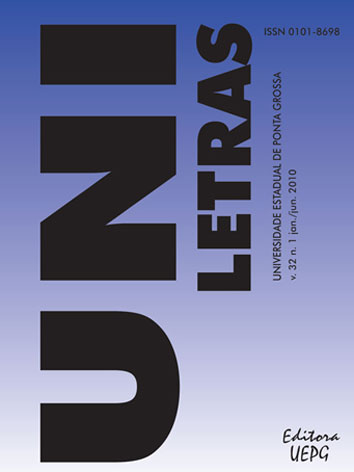The “truth” at the end of de road: an analysis of the romance everything is illuminated, by Jonathan Safran Foer, and their fi lm versions by the director Liev Schrieber
DOI:
https://doi.org/10.5212/uniletras.v32i1.2536Keywords:
Truth, Narrative, Post-modernism, Foer, Schrieber, Everything is Illuminated.Abstract
This article analyzes the novel Everything is Illuminated, by Jonathan Safran Foer, andits fi lm version directed by Liev Schrieber, focusing on the construction of a “narrative truth”. The
novel develops in three distinct lines that reveal the inner-self of the characters. Its full understanding
is only possible when we analyze these three lines altogether, once they can produce the meaning of
the narrative, unveiling characters’ motivations and understanding of life. The very idea of “truth”
- facts versus their versions - is at stake as the novel’s creation process is exposed. The article tries
to understand how it was possible for a novel so deeply marked by post-modern features – like the
use of different narrative points of view and the discussion of metafi ctional aspects – could be transformed
into a fi lm, and to what extent these aspects are lost or gained new forms when transported
to the big screen.
Key words: Truth; Narrative; Post-modernism; Foer; Schrieber; Everything is Illuminated.
Downloads
Downloads
Issue
Section
License
Authors that publish in the journal agree with the following terms:
a) The authors keep the copyright and grant to the journal the rights of the first publication, with the work simultaneously being licensed under the Creative Commons Attribution License that allows the sharing of the work with the recognition both of the authorship and the initial publication in this journal.
b) This journal provides immediate public access to all of its content, following the principle that making scientific knowledge freely available to the public provides greater worldwide democratization of knowledge. For more information about this approach, visit Public Knowledge Project, a Project that developed this system to improve the academic and public quality of research, distributing OJS as well as other softwares to support the publication system to public/open access to academic sources. Names and e-mail addresses in this website will be used exclusively for this journal purposes, not being available for other ends.

This work is licensed under a Creative Commons Attribution 4.0 International License.





